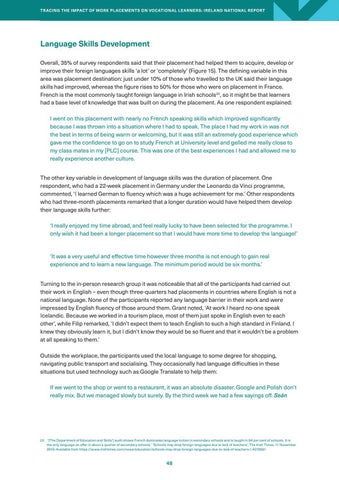TRACING THE IMPACT OF WORK PLACEMENTS ON VOCATIONAL LEARNERS: IRELAND NATIONAL REPORT
Language Skills Development Overall, 35% of survey respondents said that their placement had helped them to acquire, develop or improve their foreign languages skills ‘a lot’ or ‘completely’ (Figure 15). The defining variable in this area was placement destination: just under 10% of those who travelled to the UK said their language skills had improved, whereas the figure rises to 50% for those who were on placement in France. French is the most commonly taught foreign language in Irish schools22, so it might be that learners had a base level of knowledge that was built on during the placement. As one respondent explained: I went on this placement with nearly no French speaking skills which improved significantly because I was thrown into a situation where I had to speak. The place I had my work in was not the best in terms of being warm or welcoming, but it was still an extremely good experience which gave me the confidence to go on to study French at University level and gelled me really close to my class mates in my [PLC] course. This was one of the best experiences I had and allowed me to really experience another culture. The other key variable in development of language skills was the duration of placement. One respondent, who had a 22-week placement in Germany under the Leonardo da Vinci programme, commented, ‘I learned German to fluency which was a huge achievement for me.’ Other respondents who had three-month placements remarked that a longer duration would have helped them develop their language skills further: ‘I really enjoyed my time abroad, and feel really lucky to have been selected for the programme. I only wish it had been a longer placement so that I would have more time to develop the language!’
‘It was a very useful and effective time however three months is not enough to gain real experience and to learn a new language. The minimum period would be six months.’ Turning to the in-person research group it was noticeable that all of the participants had carried out their work in English – even though three-quarters had placements in countries where English is not a national language. None of the participants reported any language barrier in their work and were impressed by English fluency of those around them. Grant noted, ‘At work I heard no-one speak Icelandic. Because we worked in a tourism place, most of them just spoke in English even to each other’, while Filip remarked, ‘I didn’t expect them to teach English to such a high standard in Finland. I knew they obviously learn it, but I didn’t know they would be so fluent and that it wouldn’t be a problem at all speaking to them.’ Outside the workplace, the participants used the local language to some degree for shopping, navigating public transport and socialising. They occasionally had language difficulties in these situations but used technology such as Google Translate to help them: If we went to the shop or went to a restaurant, it was an absolute disaster. Google and Polish don’t really mix. But we managed slowly but surely. By the third week we had a few sayings off. Seán
22 ‘[The Department of Education and Skills’] audit shows French dominates language tuition in secondary schools and is taught in 94 per cent of schools. It is the only language on offer in about a quarter of secondary schools.’ ‘Schools may drop foreign languages due to lack of teachers’, The Irish Times, 11 November 2019. Available from https://www.irishtimes.com/news/education/schools-may-drop-foreign-languages-due-to-lack-of-teachers-1.4078581
48



